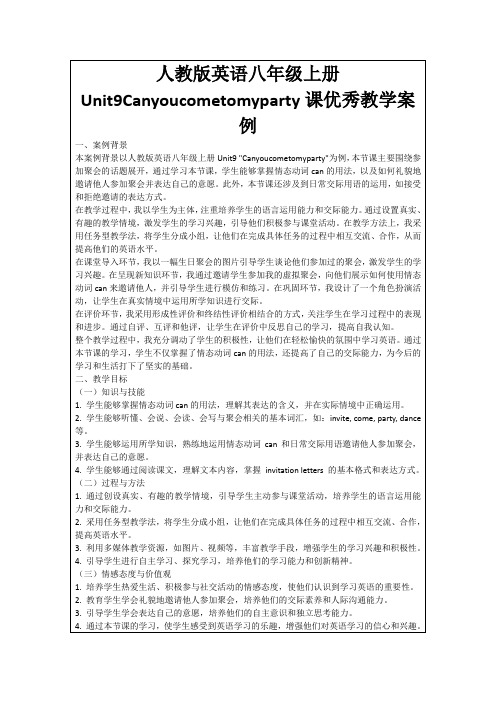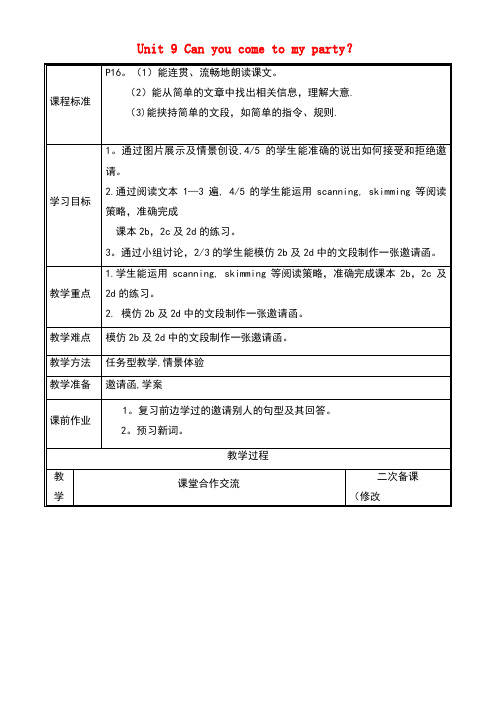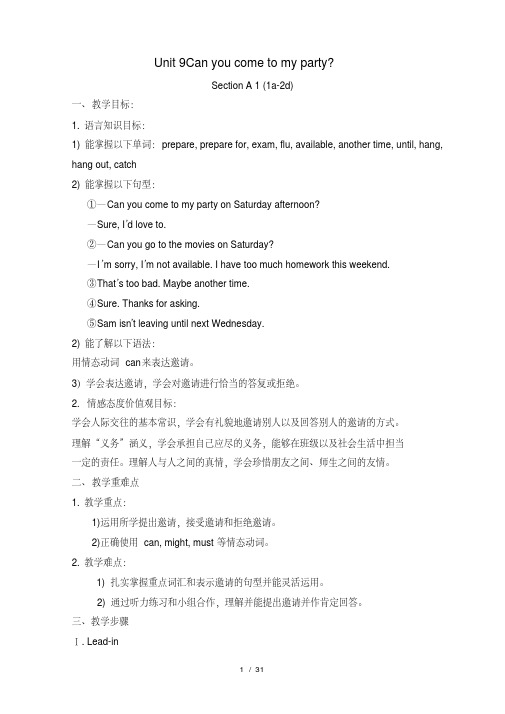Unit9Canyoucometomyparty教案
- 格式:docx
- 大小:20.37 KB
- 文档页数:7


人教版英语八年级上册Unit 9《Can you come to my party》教学设计一. 教材分析人教版英语八年级上册Unit 9主要讲述了关于邀请别人参加聚会的情境。
通过本单元的学习,学生能够掌握与聚会相关的词汇和表达方式,学会如何礼貌地邀请别人,并能够用英语进行简单的交流。
本单元的核心句型是“Can you come to my party?”,以及回答“Yes, I can.”和“No, I can’t.”。
二. 学情分析八年级的学生已经具备了一定的英语基础,能够听懂并运用简单的英语进行交流。
他们对学习英语有浓厚的兴趣,并且愿意积极参与课堂活动。
然而,部分学生可能在口语表达和听力方面还存在一定的困难,需要教师的引导和帮助。
三. 教学目标1.知识目标:学生能够掌握与聚会相关的词汇和表达方式,学会如何礼貌地邀请别人,并能够用英语进行简单的交流。
2.能力目标:学生能够听懂并运用核心句型“Can you come to my party?”进行交流,提高口语表达能力。
3.情感目标:学生能够在课堂上积极参与,培养合作意识和团队精神。
四. 教学重难点1.重点:学生能够听懂并运用核心句型“Can you come to my party?”进行交流。
2.难点:学生能够正确使用情态动词“can”来表达自己的能力。
五. 教学方法1.情境教学法:通过创设真实的聚会情境,激发学生的学习兴趣,提高他们的口语表达能力。
2.交际法:通过小组讨论和角色扮演等方式,培养学生的合作意识和团队精神。
3.任务型教学法:通过完成各种任务,引导学生主动参与学习过程,提高他们的自主学习能力。
六. 教学准备1.教学材料:教材、多媒体课件、录音机、磁带或音频文件。
2.教学环境:教室布置成聚会场景,悬挂气球、彩带等装饰物。
七. 教学过程1.导入(5分钟)教师以提问的方式引导学生回顾已学过的与聚会相关的词汇,如“birthday party”、“house party”等。

Unit 9 Can you come to my party?
尊敬的读者:
本文由我和我的同事在百忙中收集整编出来,本文档在发布之前我们对内容进行仔细校对,但是难免会有不尽如人意之处,如有疏漏之处请指正,希望本文能为您解开疑惑,引发思考。
文中部分文字受到网友的关怀和支持,在此表示感谢!在往后的日子希望与大家共同进步,成长。
This article is collected and compiled by my colleagues and I in our busy schedule. We proofread the content carefully before the release of this article, but it is inevitable that there will be some unsatisfactory points. If there are omissions, please correct them. I hope this article can solve your doubts and arouse your thinking. Part of the text by the user's care and support, thank you here! I hope to make progress and grow with you in the future.。

人教版八年级上Unit9Canyoucometomyparty课例教案教学设计【课题】八年级上册Unit 9 Can you come to my party?课例【任课教师】牛璐【教材分析】本单元的中心话题是“学会邀请朋友来参加自己的派对以及如何礼貌的拒绝别人的邀请”,具体涉及丰富多彩的派对或者活动以及各种各样的拒绝理由电视节目,轻松有趣,学生围绕如何举办不同的活动展开想象并制作邀请卡片最后实施邀请。
语言技能和语言知识集合都是围绕“邀请,接受和拒绝”这一中心话题设计的。
Section A 所呈现的是请求和拒绝的表达方式以及与此相关的基本语言知识点的初步运用并会发表见解。
Section B 具体让学生对各类活动展开邀请接受和拒绝。
在之前的单元已经学习过表示请求的疑问句Can you ...,因此在这一单元既整合了做家务,看医生,做作业等短语也补充了新的短语。
【学情分析】八二班学生活泼好动,喜欢参与活动,但是英语知识基础较差,所以本课设计知识语法涉及到之前学过的很多短语,听说难度不高,有利于增长学生自信心,活动环节较为丰富,这样能够活跃课堂气氛,提高对英语课的兴趣。
【教学目标】能掌握以下句型:Can you come to my party ? 学会发邀请函,接受邀请,礼貌的拒绝邀请,以及拒绝邀请的几种不同表达方式。
能熟练地用英语和伙伴互相邀请并拒绝,谈论日程安排。
让学生了解中西方文化的差异,了解西方日常交际。
通过日常活动安排调查教会学生合理的安排时间。
新单词:prepare,available ,flu ,afraid,invitation,hang out catch ,preparations,句型:---- Can you come to my party? ---- Sure , I …d love to. / Certainly /That?s sounds great./I am sorry I can?t/ I am not available. -----That?s too bad ,Maybe another time.【教学重点和难点】句型:Can you...?I am not available. I have to go to the doctor. I am going to help my parents . I have the flu.【教学设计】Step 1 Lead-in .Greetings:Teacher: How are you today?Students: I am fine and you?Teacher: I feel good! Thank you and let us enjoy a song, guess which festival is coming ? (listen to the funny song ) Students: Christmas!Teacher: Yes !You are right! So Miss Niu will have a Christmas party in my house this weekend. Would you like to come? Can you come to my party?Student A : Sure, I?d love to. / I …d like to.(write them on the blackboard)Student B: Yes, I can. Yes , of course! (Nobody says Certainly, So I wrote certainly on the black board, and lead them to read ) Teacher: If you can?t come to my party, What will you say?Show pictures and the phrases on the screen: go to the doctor, meet my friends. Help with house work . Catch the flu,...( Input )Step 2 Activity and practise: a game “why why tell me why”(Output)Rules: everybody claps and say”why why tell me why”and students shout outtheir reasons one by one. Those who is slow out, the last ten students have therights to get colorful cards and write their own reasons on the cards. And let fivestudents stick it into the blackboard.(there is already a calender on it)and askand answer questions about the conversation of 2c.(to practice the new words available and another time. Teacher set anexample first)Step3 Activity and practice: box timeThe other five students put the card into a box(prepared before) and pass the box to anyone they wa nt and ask “can you come to my party” who get the box must pick a card from the box and make sentence with the key words on it as the conversation of 2cStep 4 listening( Teacher say now let’s have a look at how are Jeff and Mary do the invitation)While-listening: fill in the blanks in 2a 2bPost-listening: let students from different english levels to answer the different questions.(Emotional education : Girls learn to refuse . Boys learn to invite.)Step 5 Activity and expanding4 members per team to design an invitation card and invite as many students as possible .And team one wins.Step 5 SummaryGrammar focus Sentence Pattern and words and phrases.Step 6【板书设计】Unit 9 Can you come to my party?CertainlySure , I?d love to. Sorry, I have to... Sorry. I am going toavailable = free Wed. Thu Fri. yesterday today tomorrow反思本节课预设目标基本完成,使不同层次的学生均有收获,基础较差的学生能够通过大量的练习和语言氛围熏陶能够说出本节课要求的句型并通过听力检验,能够回答简单的问题。

Unit 9Can you come to my party?Section A 1 (1a-2d)一、教学目标:1. 语言知识目标:1) 能掌握以下单词:prepare, prepare for, exam, flu, available, another time, until, hang, hang out, catch2) 能掌握以下句型:①—Can you come to my party on Saturday afternoon?—Sure, I’d love to.②—Can you go to the movies on Saturday?—I’m sorry, I’m not available. I have too much homework this weekend.③That’s too bad. Maybe another time.④Sure. Thanks for asking.⑤Sam isn’t leaving until next Wednesday.2) 能了解以下语法:用情态动词can来表达邀请。
3)学会表达邀请,学会对邀请进行恰当的答复或拒绝。
2. 情感态度价值观目标:学会人际交往的基本常识,学会有礼貌地邀请别人以及回答别人的邀请的方式。
理解“义务”涵义,学会承担自己应尽的义务,能够在班级以及社会生活中担当一定的责任。
理解人与人之间的真情,学会珍惜朋友之间、师生之间的友情。
二、教学重难点1. 教学重点:1)运用所学提出邀请,接受邀请和拒绝邀请。
2)正确使用can, might, must 等情态动词。
2. 教学难点:1) 扎实掌握重点词汇和表示邀请的句型并能灵活运用。
2) 通过听力练习和小组合作,理解并能提出邀请并作肯定回答。
三、教学步骤Ⅰ. Lead-in在大屏幕上创设场景引入对话讨论。
T: What do you do on weekends?Ⅱ. New wordsprepare, prepare for, exam, fluIII.Work on 1aT: Match the phrases with the pictures (a-e).IV. Work on 1b1. T: Now listen to the recording and write the names next to the correct students inthe picture.2. Play the recording for the first time.Students only listen. Play the recording asecond time.Write the name of each person next to his or her picture.3. Play the recording again. Check the answers with the Ss.V. Role-play the conversation from listening textAsk Ss to pay attention to how to make, accept and decline the invitation.Sun Ning: Hey, Ted. Can you come to my party on Saturday afternoon?ents.Ted: I’m sorry, I can’t, Sun Ning. I have to help my parSun Ning: Too bad. How about you, Jenny? Can you come to my party?Jenny: I’d love to.Sun Ning: Tim? What about you?Tim: When is it?Sun Ning: Saturday afternoon.Tim: Oh, no, I can’t. I have to prepare for an exam.Sun Ning: What about you, Wilson?Wilson: Sorry, I must go to the doctor.Sun Ning: Anna, can you come?I might have to meet my friend.Anna: I can’t, Sun Ning.Kay: I can’t either, Sun Ning. I have the flu.Sun Ning: That’s too bad, Kay. Oh, maybe next time. What a small party! VI. Group workWork on 1c.Let some groups ask and answer according to picture in 1a.VII. ListeningWork on 2a:1. Read the sentences in 2a. Tell Ss they will listen to some sentences. They shouldlisten and circle the words “can” or “can’t”in the bracket.2. Play the recording for the Ss to listen and circle the words.3. Play the recording again to check the answers.Work on 2b:1. Let Ss read the chart below. Tell Ss, this time they must write the reasons in thechart. Make sure they know what to do.2. Play the recording for the Ss to write the reasons in the chart.3. Play the recording again to check the answers.4. Role-play the conversation:Conversation 1Anna: Hi, Jeff? Can you come to my party on Saturday?ight have to meet my friend on Saturday.Jeff: I’m sorry, I’m not free. I mConversation 2Anna: Hello, Mary! Can you come to my party on Saturday?Mary: I’d love to. Do I need to bring anything?Anna: No, I’ll buy all the food and drinks.Conversation 3Anna: May, can you come to my party tomorrow?May: I’m afraid not. I have the flu.Anna: Oh, that’s too bad. Well, drink lots of hot water and get lots of sleep. Conversation 4Anna: Mei Ling, can you come to my party on Saturday?math test.Mei Ling: Sorry, but I’m not available. I must study for aAnna: OK. Good luck!Conversation 5Anna: Hey, Paul. Can you come to my party on Saturday?Paul: Sure. It sounds great. When will it start?Anna: Around 6:00 p.m. See you then.Paul: See you.5. Listen and complete Anna’s diary.party on Saturday. I ask some of my friends to my party. MaryI’m ________aand Paul would love ___ _____, but Jeff _____ _____ __ meet his friend. Maycan’t come, _____. She has the _____. Mei Ling is not ________. She _____ studyfor a _____ test.VIII. New wordsavailable, another time, until, hang, hang out, catchIX. Pair work1. Tell Ss to look at the reasons in the chart in 2b. Then write some more.2. Let Ss read conversations in 2c.3. Ss practice the conversations using the reasons in the chart on the right.4. Ask some pairs to act out their conversations.X. Reading1. Read the conversation and answer the questions.1) What did they do last fall? _____________________________________2) What does Nick have to do on Saturday? _____________________________3) When will they hang out?_____________________________2. Let Ss practice the conversation with their partners. Then let some pairs act out theconversation.3. Fill in the blanks according to the conversation.Jeff’s _______ Sam _____ Xi’an is going to visit him on Saturday. Jeff and his friend Nick _____ bike riding together last fall when Sam came. But thisSaturday Nick _____ come to Jeff’s house because he ____ _______ ____ an exam on Monday. Luckily, Sam isn’t leaving ______ next Wednesday. Nickcan ______ them on Monday and then _____ ____ together on Monday night.XI. Language points1. I’m sorry. I’m not available.此句中的available表示“有空;不忙;有时间交谈,聊天”,其后还可用to do引出具体的事情。

Unit9 Can you come to my party. Section A(2a-2d)教案教学内容:Unit9 Can you come to my party. Section A(2a-2d)教学目标:以听说方式巩固和拓展邀请内容;阅读对话,在真实的语境中学习礼貌拒绝的方式。
文化意识:了解英美国家不同邀请方式的文化。
情感态度:运用得体的语言接受或拒绝邀请。
学习策略:借助图片、场景、人物等信息进行听前,读前预测;听中,读中注意捕捉关键信息在真实的语境中学习地道的表达。
教学过程:Step1: GreetingStep2:创设情境导入T:These days, I’m very busy and tired, but I’m very excited .Can you guess :Why?S:T:My thirtieth birthday is coming .It’s on Sunday.T:For birthday party,I prepared a nice music. OK. show your hands and clap hands with music.Step3:ReviewT:I want to invite all of you to come to my party. Can you come to my birthday party?S:Step4:课文呈现2aT:I’m looking forward to a big party, so I invite another five friends.Pre-listening(听前预测)要求学生读2a中的5幅图以及5个句子,回答老师问题:Who are they? S:(播放录音)Post-listening T: Have you got these answers ?So Let’s check the answers.T:What did I say to invite them?S:T:if you want to invite someone, you can say …Follow me:Can you…?T:If you want to invite others, You can also say :Would you like to…?T:check the answer 2a1.Jeff (can / can't) go to the party.2.Mary (can / can't) go to the party.3.May (can / can't) go to the party.4.Mei Ling (can / can't) go to the party.5.Paul (can / can't) go to the partyStep5 :work on 2bT:just only Mary and Paul come to my party, I’m so sorry. Maybe I should prepare a small party.T: Who can’t go to my party? write down their names. This time you just listen key sentences Now, youhave twenty seconds to read the paper. Are you ready? Why can’t they come to my party? tell me reasons NamesReasonsStep7 work on 2cgroup work :Step7 work on 2dBefore ReadingT: 呈现主题图,观察并提问: can you see? are they doing?引出新短语go bike ridingT: 观察对话,Who are they?While -listeningThe first time:Read 2d quickly and answer the questions (read by yourself)1. Who is the third boy?2. When did they go bike riding?The second time: listening again and fill in the blanks.Jeff :Hey, Nick, come to my house on Saturday?My cousin Sam Xi'an is going to be here.Nick :Oh, Sam! I remember we together lwhen he visited you. Jeff :Yes, that's right.Nick : come, I'm afraid I can't. Iexam on Monday so I must prepare for it.Jeff :That's really too bad! Oh, but Sam isn't leaving next Wednesday. Can you with us on Monday night?3. Nick :Sure! you on Monday !Post -readingRole -play:模仿录音读分组读 Step8 SummaryStep9 HomeworkSuppose you will have a birthday party this Saturday. You want to invite your friends , but some of them can’t come to the party, please write the dialogues between you and your friends.。
Unit 9 Can you come to my party教学设计教学目标听:①能听懂本话题的语段。
②能听懂听力材料中邀请的内容、时间、地点等要素。
说:①能熟练地用英文进行口头邀请的交流。
②能谈论自己接受或婉转拒绝邀请的理由。
读:①能正确朗读所学词语及短文。
②能理解短文并抓住大意。
写:①能用本单元句型提出邀请或表示接受、拒绝邀请及陈述理由。
②能参照课本中的短文,写简单的邀请卡或邀请函及回复。
重点难点1.学习有关本单元话题的词汇2.学习并能运用can/could/would you please 等句型表达客气、礼貌地邀请。
3.学习并能运用have to/be doing 表示计划、安排要做的事。
学习策略:鼓励学生与人合作,共同完成学习任务对所学内容积极主动操练掌握一些阅读技巧与方法,培养逻辑思维能力情感与价值观:培养学生讲礼貌;了解西方社交礼仪,注意跨文化交际。
教材分析本单元主要学习can另一个用法,即表示提出邀请,征询对方的意见。
通过完成任务,学生能够用英语提出邀请,能以多种方式礼貌地地征询他人意见、学会表达自己的意见,并提供合适的理由。
同时,通过本单元的学习,学生了解西方的社会礼仪文化,学习一些人际交往的艺术等。
课后反思本节课充分体现快节奏、高密度原则,既有语言知识的学习,又有学法指导,同时结合校庆对学生进行情感教育。
教学步骤及环节设计精心,安排合理,水到渠成。
任务设计贴近学生生活,实在而不生硬。
学生接受能力较强,能凭借已有知识及表格练习归纳写作要素。
不足之处:由于时间紧,内容多,最后学生展示及点评未能完成。
可以将第一步的三篇阅读材料改为两篇,或将学生分为三组分别完成,再合成。
第四步,学生在写作过程中较多地进行细节描写,如野餐的食品名称的罗列等费时较多,而没能完成其它内容。
可以给出范文提示,使学生学会抓重点。
Unit9Canyoucometomyparty.教案Unit9 Can you come to my party?1.会使⽤句型“Can you...?”发出邀请;会运⽤“Sure,I d love to.That sounds great!”等句⼦接受邀请;会⽤“Sorry,I can t.I must/have to...Sorry.He/She has to/ must...”等句⼦委婉地拒绝邀请。
2.采⽤听⼒训练、⼩组对话、分⾓⾊表演、制作调查表格等⽅式来巩固⽇常⽤语;通过看图、找关键词等阅读策略培养阅读能⼒。
3.通过学习本单元的内容,了解英美国家举办聚会的习俗,了解举办聚会的基本步骤;通过送别⽼师和朋友,学会感恩⽼师、珍惜友谊。
Section A(1a~1c)●课时重点:1.会使⽤句型“Can you...?”来邀请别⼈,并能恰当地接受或委婉地拒绝他⼈的邀请。
2.会运⽤⼀些相关的动词短语来表达拒绝的理由。
⼀、填⼀填1.来参加我的晚会come to my party2.为考试做准备prepare for an exam3.去看医⽣go to the doctor4.得流感have the flu⼆、译⼀译1.Can you come to my party on Saturday afternoon?周六下午你能来参加我的聚会吗?2.Sure,I d love to.当然,我很乐意。
3.I have to prepare for an exam.我得为考试做准备。
4.I must go to the doctor.我必须去看医⽣。
活动⼀1.完成教材上的1a,把动词短语和相对应的图⽚进⾏匹配,并在⼩组⾥核对答案。
2.听教材上1b的录⾳第⼀遍,把下列名字:Tim,Kay,Anna,Wilson写在图中正确图⽚的横线上。
3.听录⾳第⼆遍,写出四个同学的邀请回答。
Tim:Kay:Anna:Wilson:活动⼆在⼩组⾥先仿照例⼦编对话,然后分⼩组进⾏展⽰。
Unit 9 Can you come to my party?Period 1 Section A (1a-2d)一、教学目标:1. 语言知识目标:1) 能掌握以下单词:Prepare, prepare for, exam, flu, available, another time, until, hang, hang out, catch.能掌握以下句型:—Can you come to my party on Saturday afternoon?—Sure, I’d love to. \Sorry, I can’t. I have to ...\I’m sorry ,too. I must …—That’s too bad.—Maybe another time.__ Thanks for asking.2) 能了解以下语法:情态动词can的用法2. 情感态度价值观目标:该部分内容贴近学生的生活,谈论的话题是能力。
通过互相询问或谈论自己或对方在某一方面的能力,可以培养学生的一种群体意识。
二、教学重难点1. 教学重点:情态动词can引导的一般疑问句表达邀请之意时的礼貌作答。
2. 教学难点:情态动词can的构成和使用。
三、教学过程Step 1. Leading inPlay the song: Happy birthday.Say ,Today is Meimei’s birthday. She wants to invite you to he birthday party. Can you tell me what she should say.Ask students to say.Step 2 Pre-taskPage 65,1a &1bAsk, Can you come to my party?Ask some students to answer. Ask the students who can’t come to tell the reasons.Call attention to the words in activity 1a. Read together.Say, Look at the pictures and ask students to tell what they see in each sence.Match the words with the pictures and check the answers.Say, Now listen to the recording. Write the name of each person next to his or her picture.Play the recording. Ask students to complete the activity individually.Step 3 While-taskPage 65 1cPoint to the example in the box. Ask students to do a practice with partners.Ask some groups to act.Game: One student invite some students to his \her party. The other students answer.Page 66, 1cPoint to five sentences.Say, Listen to each conversation and then circle the word that makes the sentences correct.Play the recording.Check the answers.Page 66 , 2bCall attention to the five sentences in activity 2a, ask a student to read the sentences to the class saying the correct word “can”\”can’t”.Say, Now listen to the recording again. Write the names who can’t go to the party and the reasons.Play the recording. Write down these answers.Check the answers.Step 4 Post-taskPage 66,2c.Call attention to the points listed in activity 2b.Ask students to make their own conversation like the example. As students work, move around the room and monitor.Ask students to present their conversations.Page 66, 2d.Have students scan the conversation in 2d.Lead students to practice reading the conversation.Make students role-play the conversation. In this part, student A will be Jeff. Student B will be Nick. As they work, move round to monitor their work.Ask a pair of students to present the conversation to the class.Step 5 HomeworkPractice: Invite your friends to come to your home for dinner. Write down their answers.Do the exercises on Page 60 in Students’ book.教学后记Period 2 Section A (Grammar Focus-3c)一、教学目标:1. 语言知识目标:1) 能掌握以下单词:Invite, accept, refuse, study for a math test, watch TV , on the weekend, practice the violin能掌握以下句型:1. —Can you come to my party on Saturday afternoon?—Sure, I’d love to. \Sorry, I can’t. I have to ...\I’m sorry ,too. I must …2.—Can she go to the ball game?__ No, she is not available. She must go to the doctor.Can they go to the movies?No, they’re not free. They might have to meet their friends.2. 情感态度价值观目标:该部分内容贴近学生的生活,谈论的话题是能力。
通过互相询问或谈论自己或对方在某一方面的能力,可以培养学生的一种群体意识。
二、教学重难点1. 教学重点:Can you come to my party? When is it? Next week, on Thursday night. I have to study for a math test.2. 教学难点:Learn to make , accept and decline invitations politely.三、教学过程Step 1. Leading inAsk: How many students did you invite yesterday? What did they say?Ask one student to show his or her answers.Step 2 Pre-taskPage67,Grammar FocusReview the grammar box. Ask students to say the questions and answers.Talk about the two ways people give reasons for saying no to a invitation.3.Call attention to “must” and “have to”.Step 3 While-taskPage 67,3aCall attention to 3a,. Read the instructions to the class.Ask students to read the phrases in the box and the five conversations quickly.Ask students to complete the answers following the instructions.Ask two students to act out the conversations they have just completed.Page 67 , 3bCall attention to3b.Students complete the sentences with the words in brackets on their own.Ask some pairs of students to present the conversations to the class.Step 4 Post-taskPage 67,3c.Read .the instructions for this activity to the class.Ask students to read the sample conversation.Students complete the chart on the right.Then invite classmates to your party. Make conversations following the sample in the box.Step 5 HomeworkReview the grammar box.Do the exercises on Page 61 in Students’ book.教学后记Period 3 Section B (1a-1f)一、教学目标:1. 语言知识目标:能掌握以下单词:Weekday, weekend, Sunday, Monday, Tuesday, Wednesday, Thursday, Friday, Saturday , the day before yesterday, the day after tomorrow, play soccer, play tennis, study for a test, have a piano lesson, look after.能掌握以下句型:1. What’s today? It’s Monday the 14th.2. Can you play tennis with me?2. 情感态度价值观目标:该部分内容贴近学生的生活,谈论的话题是能力。